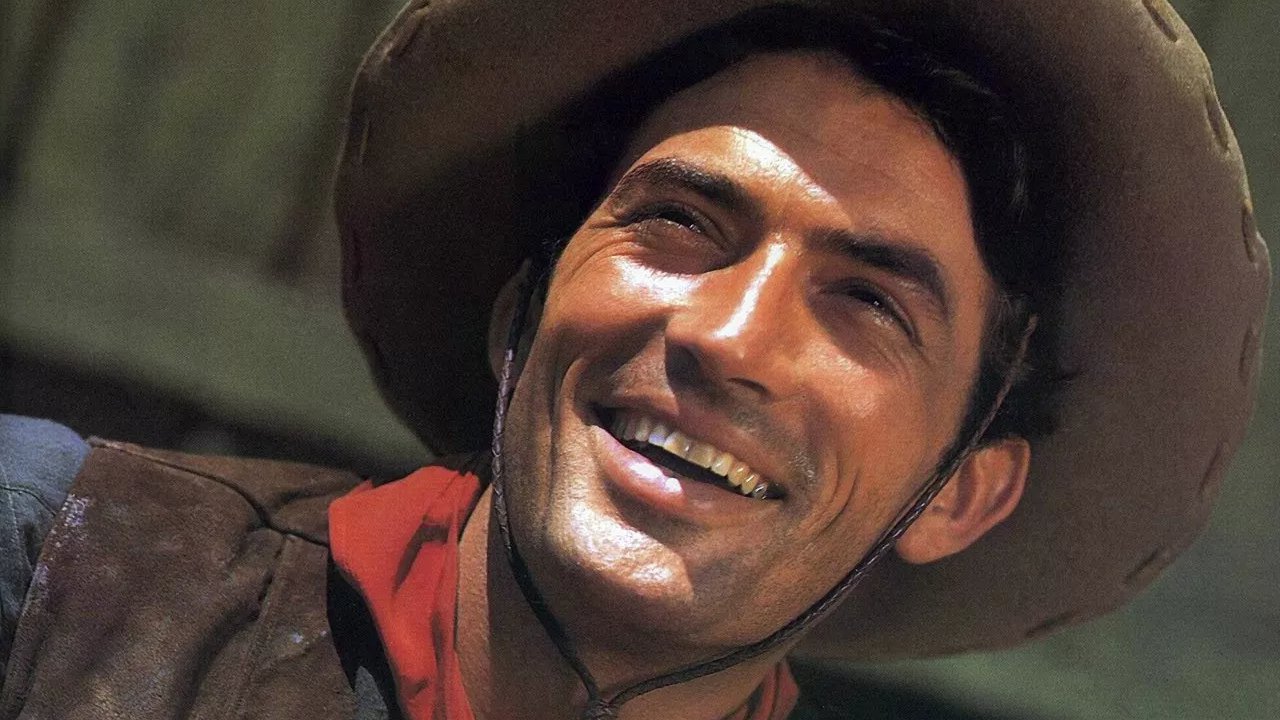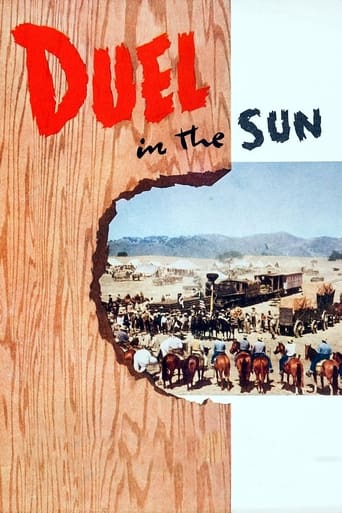

Released in 1946 and directed by King Vidor, "Duel in the Sun" stars Gregory Peck and Joseph Cotton as two rival sons of a ranch baron (Lionel Barrymore) in West Texas in the 1880s. When a striking half-breed (Jennifer Jones) comes to live on the ranch, she inspires love in the mild-mannered, educated son (Cotton) and unpredictable lust in the mocking, wild one (Peck). Lillian Gish plays the mother stuck in the middle while Walter Huston appears as a semi-questionable minister known as The Sinkiller. Charles Bickford is on hand as an older man also interested in the drama mama.While the movie runs 2 hours and 24 minutes, a full 16 minutes is opening and ending music, which makes the runtime of the story itself just over 2 hours. Speaking of the opening "Prelude" and "Overture," the music (by Dimitri Tiomkin) is thoroughly passé and goes on way too long at 12 minutes before the credits, which last another 1:35. If you can get past that, though, this is a great old Western where the producers pulled out all the stops to entertain. Producer, writer and (uncredited) director David O. Selznick's ambition was to top "King Kong" (1933) and, particularly, "Gone with the Wind" (1939), two other pictures he produced.Although critics fittingly dubbed it "Lust in the Dust," the movie WAS popular with the masses, no doubt helped by its controversial sexual content (which is tame today) and Selznick's affair with Jones, which broke up both of their marriages. They got married a few years later and it lasted till his death in 1965. Despite its box office success, "Duel" couldn't top "Gone with the Wind" and, being the most expensive film ever made at that point, it only broke even, although it eventually went on to make a profit with a re-release in 1954, etc.Jones is notable as the heavy-breathing babe, but I personally prefer Joan Tetzel as the fiancé of the older son (Cotton). Also, Peck plays the bad son surprisingly well, considering how he's known for playing more noble protagonists, e.g. "The Big Country" (1958) and "Mackenna's Gold" (1969).Bottom line: "Duel in the Sun" was just too big of a production to lose. Its story, while decidedly melodramatic, is compelling from beginning to end and there are highlights spiced throughout, including some stunning cinematography, amusing moments with horses and a couple of almost shocking sequences and story turns (e.g. the shootout in the saloon and, later, on the town street). To be expected, there are also some lowlights, but the movie always quickly recovers and maintains its footing. Lastly, there's a valuable moral hidden within the Western soap operatic shenanigans. The film was shot in Arizona & California (too many places to list). The script was written by David O. Selznick & Oliver H.P. Garrett (and, uncredited, Ben Hecht) suggested by a novel by Niven Busch. ADDITIONAL CAST: Herbert Marshall, Harry Carey, Scott McKay & Butterfly McQueen.GRADE: A
... View MoreKing Vidor's "Duel in the Sun" is arguably a great western and perhaps the most entertaining westerns I have ever seen before, as well as one of the best David O. Selznick productions I have seen since Hitchcock's Spellbound (1945), and Victor Fleming's Gone with the Wind (1939). The movie stars Jennifer Jones (in an Oscar nominated performance) as Pearl Chavez a young woman from Mexico whose mother dies and her father (played by Herbert Marshall) ends up getting hanged for the murder of her mother, and Pearl feels bad about the whole thing and has to live at a relative's house in Texas where she is welcomed into her new home by an older woman named Laura Belle McCanles (played by Lillian Gish in an Oscar nominated performance) and her husband Jackson (played by Lionel Barrymore) and their two sons one who is the oldest brother and happens to be a lawyer named Jesse (played by Joseph Cotten), and the younger immature Lewton (or Lewt, who was played by Gregory Peck) which at first Pearl was in love with Jesse and then after he left she started to have a complicated relationship with Lewton. The movie also has an excellent supporting cast let alone Gish and Barrymore but it also includes Walter Huston as the local priest, and Charles Bickford as a middle aged man who wants to marry Pearl but the marriage ends before it could possibly begin. The movie has a lot of good technical aspects to it as well for example all the costumes are perfect, the cinematography by Harold Rosson, Lee Garmes, and Ray Rennahan is shot brilliantly. as well as the music by Dimitri Tiomkin is just beautiful to listen to. Another good thing about the movie was David O. Selznick's screenplay is has nothing short of great dialogue throughout the entire film, as well as the production. This movie was a western film experience that I will treasure and never forget this is one of 1946's best films.
... View MoreLet me tell you about a funny little movie. In 1946, producer David O. Selznick had the on-paper great idea to make a quasi-sequel to his big hit Gone with the Wind, another sprawling Western with intrigue, love, and gorgeous vistas and women. So he set out to make what would become Duel in the Sun, about an orphaned "half-breed" (the film's words), who is left in the care of her father's long-ago love on a giant cattle ranch in Texas in the 1800s. She's immediately drawn to each of the sons of the cattle baron who rules the land (Lionel Barrymore) – the intelligent, kind Jesse (Joseph Cotten) and his brawling, sneering brother Lewt (Gregory Peck). Danger surely will follow.It was a movie that effectively ended Selznick's career as a producer, as the unheard-of budget of $2 million ballooned to $8 million, and even though there were Oscar nominations, the movie didn't fare too well at the box office, with most of the gross coming from rentals later in the century. Selznick was a known micromanager, going through as many as seven (!) directors for the film, including himself, before King Vidor stepped in and somehow made it work. Sort of.Aside from the main plot of poor Pearl Chavez (Jennifer Jones, who later married Selznick, no coincidence there) and her loves and her (naturally) Spanish passion, there is a subplot about how the US government is trying to build its railroad across the country, but Senator McCanles (Barrymore) will be doggoned if he'll let them there Yankees run through his huge, huge, huge holdings.One look at the posters and other artwork for this movie and you'd think you were in for a romance film, something based on a Harlequin book. Jones on her back, hand raised to protect herself both from the glare of the sun and the actions of the man before her, Peck. And maybe you'd think that with such a great cast (including Lillian Gish, Herbert Marshall, Walter Huston, and Butterfly McQueen) and such a beautiful setting, it might be worthwhile. After all, "duel" is right there in the title, so surely there's action. Oh, boy.There's hardly any. Almost every scene in which Jones appears ends with her storming off or crying out in desperation, hand held to forehead. Her character isn't shown as a strong role model, she's shown as fiesty, which is code for "not knowing her place as a plaything"; Pearl is played with by Lewt, for the most part, so naturally she's fond of him. Aren't most women in favor of the bad boy? Ahead of its time, Duel in the Sun talks quite a bit about sex without really mentioning it.Aside from the morally debatable issues with Pearl's character as a woman, there's the relentless racism. Every pejorative you can think of for Native American is tossed out there and then laughed off. That's in addition to the stereotyping of Mexicans as people who just can't control their temper. It doesn't take long for it to get old and a little sickening. Pearl's not permitted to be her own person, just one who's owned.To top it off, this almost could have worked were it not for Jones' performance (although Oscar nominated). She vamps it up in the campiest way possible; perhaps she thought she was doing a soap-opera stint. Her acting is laughable nearly the entire way through. Cotten makes a terrific good guy, and Peck is commanding as the amoral, takes-what-he-wants Lewt. Lionel Barrymore, of course, plays the senator just like he would play mean Mr. Potter in It's a Wonderful Life, which is to say much like he played many of his one-dimensional characters. Gish is a sweet delight as always.Oh, and the duel? Yes, it happens, and yes it happens in the sun – on the side of a mountain, no less, but perhaps not between the two people you'd expect. Still, every moment of the so-called duel is excruciating to watch; you want them to hurry up and get on with it already. How long can high noon last? Rhetorical question.Duel in the Sun is a dated movie that's way too long, sells it characters short, stars a miscast heroine, and never tugs at any heartstrings like it wishes it could. Understandably, it was nicknamed Lust in the Dust during production, prompting a parody movie decades later. I don't know if moviegoers in 1946 thought they were watching something cutting edge, but this is one dated relic.
... View MoreThe first time I saw this dog was on television around twenty years ago. I recall squirming in embarrassment but when I saw it on sale at a giveaway price I figured I'd give it another chance. I shouldn't have bothered. I'm struggling to find just ONE good thing either in it or about it. I've always admired Gregory Peck but this has to be his worst performance ever. As much as I've always admired Peck I've always disliked Jennifer Jones who seemed to specialize in overripe Gloria Grahame type roles that always made her seem she was sporting soiled underwear. Most of the 'names' in the cast - Herbert Marshall, Charles Bickford etc - are given little more than cameos and only Lillian Gish comes out of it with any dignity. It's slightly reminiscent of High, Wide, And Handsome, another entry where they try to cram everything but the kitchen sink into an overwrought plot. On the DVD in an 'extra', Peck states that King Vidor was fired and the film was finished by William Diertle. You could have fooled me, I thought it was Ed Wood.
... View More